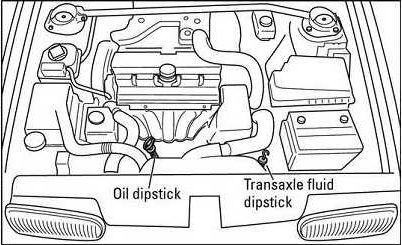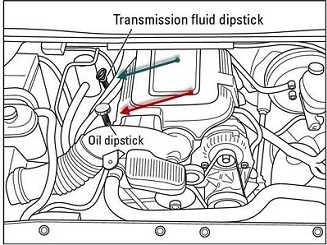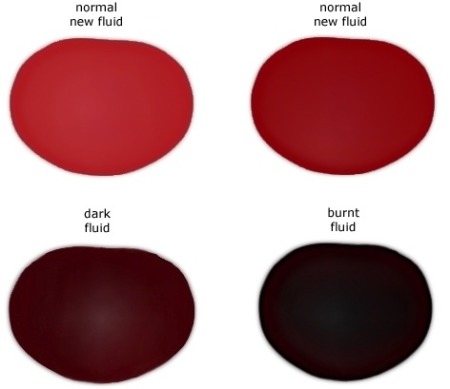Checking your vehicle’s transmission fluid is a preventative maintenance procedure that should be done at least once a month in order to spot potential early warning signs such as a low fluid level or worn out dirty/burnt fluid. Here’s how:
What Transmission Do I Have?

If you cover a lot of miles, haul heavy loads or drive in stop and go traffic, you should check more often – say every 2 weeks. This will give you time to top up or change the fluid before these issues cause serious transmission problems that can damage or destroy your transmission.
If your vehicle is showing signs of transmission problems such as slipping, hesitating or grinding, the first thing you should do before calling a transmission shop for repairs or replacement is check your fluid level. Topping up or changing fluid might be all that is needed to solve the issue and is obviously a lot cheaper than having repair work done!
To check your fluid, follow these steps:
What You’ll Need
- Clean, lint free rag
- Appropriate transmission fluid for your vehicle
- A funnel
1) Locate the Dipstick
To check your vehicle’s automatic transmission fluid, pop the hood and find the dipstick handle sticking out of your transmission.
Front Wheel Drive
It is typically found sticking out of the transaxle near the front (see below).

Rear Wheel Drive
The dipstick can probably be found near the back of the engine area as shown below:

NOTE: To check the fluid in a manual transmission, the vehicle typically needs to be raised on a hoist or blocks in order to access the plug on the bottom of the transmission.
2) Run the Vehicle
Park your vehicle on a level surface and leave the engine running. Leave it in Park or Neutral gear with the parking brake on. If your vehicle has been sitting for a while, give it time to warm up to normal operating temperature (engine should feel warm). Note that some Hondas for example must be checked within 60-90 seconds of the engine being shut off.
3) Pull Dipstick Out
Locate and remove the transmission fluid dipstick. If for some reason you can’t find it, refer to the images above or your owner’s manual.
4) Check the Fluid for Color, Smell & Consistency
Dip your finger into the fluid on the dipstick and rub it between your fingers. You want to see an almost clear, bright red or pinkish color (see colors below) with a thick, oily consistency.


If it is very dark red/reddish brown, has a noticeable burnt smell, appears very thin/watery and/or you can see small metallic particles in it, then the fluid (along with the transmission filter) needs to be changed to avoid damage.
If you find large metallic particles, a strong burnt smell and/or black fluid, then internal damage may have already occurred. Seek the assistance of a mechanic immediately.
5) Reinsert and Check the Fluid Level
If the fluid is red, clear and free of particles, the next step is to check the fluid level. Clean the dipstick with a fresh, lint free rag, reinsert it and pull it out again. If the fluid is low, use a funnel to pour some fluid down the dipstick tube to reach the line. Don’t overfill, because that can actually cause damage too!
6) Replace Dipstick and Close the Hood
You’re done! Good job.
TIP: In addition to checking the level and quality of fluid using the dipstick, be sure to look under your car occasionally for stains on the driveway or transmission pan to make sure that your fluid isn’t leaking.
Video Guide
What if the Fluid is Really Low?
If your fluid is low, not only could it cause significant damage, but it can point to a more serious problem.
The lack of fluid could be caused by a leak, which you might see under the car, but sometimes, a leak may only occur while you’re driving.
Either way, keep a close eye on the fluid level, and consult a mechanic if the condition continues.
What if My Car Doesn’t Have a Dipstick?
Believe it or not, many new vehicles don’t have a transmission dipstick, and it takes a trained technician with specialized tools to check the fluid level. If you can’t locate a dipstick under the hood, consult your owner’s manual.
Consult your owner’s manual for the exact procedure and type of fluid to use.
What Transmission Do I Have?

What to Read Next
- How to Change Transmission Fluid
- What is a Transmission Flush?
- What is a Torque Converter?
- Transmission Overheating – The #1 Killer
Over to You
We’re interested to know – where is the dipstick located on your vehicle and how often do you end up checking your transmission fluid? Let us know by leaving a comment below!

I don’t know if my 2015 Chevrolets traverse has a dipstick
slips out of drive and over drive in to neutral. you can fill it down shift when you slow to a stop. when you take off from a stop rpms go up but the van don’t move. then it will slam into gear.
Starts off in sacond gear only go in low if I pull the shafter down in low and wont shift to Odeal
Bought 2011GMC Terrain,two years haven’t checked or put any transmission oil on it